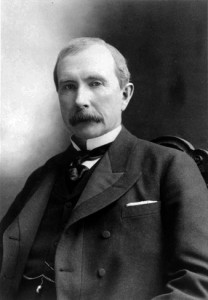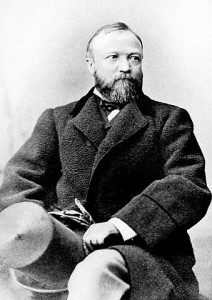Last month, Jacob Davidson published an article about the ten richest people of all time. Relative incomes were extrapolated via various means to account for differences in historic and current currency valuation. The complete list is below. I’m going to focus on three American men who built enormous fortunes before turning to philanthropic endeavors.
In American culture, there is nothing strange about striving to acquire wealth, but there is a reluctance to give any of it away. No matter how many times experts tell us money can’t buy happiness, we disagree. And to a certain extent, we’re right. A recent study by Charles Schwab found that 73 percent of those surveyed would rather have their 401 (k) account grow by 15 percent this year than lose 15 pounds.
Health is important, so are clean water, food, shelter, and clothing. Without access to these basic requirements, people consider themselves poor. At what point do they consider themselves wealthy? Justin Wolfers recently concluded that up to the threshold of $75,000, wealthier people are happier than poor people, because they can freely select life’s basic necessities. Whether $75,000 annually is a true indicator of economic wealth is probably up for debate. But I suspect there is a threshold of financial security.
However among the extremely wealthy, concern for the basics of life doesn’t exist. For these lucky folks, wealth alone doesn’t guarantee happiness. What does? In a recent article, Andrew Blackman noted people who give money away experienced greater happiness.
So, let’s take a look at three of the richest men of all time.

The seventh richest man:
John D. Rockefeller (1839-1937)
One of America’s infamous Robber Barons, Rockefeller founded Standard Oil Company in 1870. Using vertical and horizontal integration strategies, Rockefeller controlled 90 percent of American oil production in 1880. In the early twentieth century, Rockefeller’s personal wealth was estimated at $900 million.
“The only question with wealth is, what do you do with it?”– John D. Rockefeller
When running his businesses, Rockefeller never hesitated to wring the best deal he could. But he had another side – one that believed in giving to society. A lifelong Baptist, Rockefeller funded what became Spelman College in 1884. (He named the college for his in-laws.) He gave $80 million to the University of Chicago. In 1909 he founded the Rockefeller Sanitary Commission, which eradicated hookworm disease from the American South. Other donations included almost $250 million to the Rockefeller Foundation to focus on public health, medical training and the arts.
Was John D. Rockefeller a “happy” man? Who can say?

The sixth richest man:
Andrew Carnegie (1835-1919)
Andrew Carnegie immigrated to America in 1848 and made his fortune in the steel industry. Like Rockefeller, he preferred to control every aspect of production from mining to refining. In 1892 Carnegie launched the Carnegie Steel Company.
In June of that year, Americans were mesmerized by the violent struggle between labor and management. The Amalgamated Association of Iron and Steel Workers went on strike at Carnegie’s Homestead steel plant. In July strikers fought a pitched battle with Pinkerton Security Agents. The Pinkertons surrendered. The workers briefly took control of the mill, but were soon ousted by the state National Guard. By July 15 the plant was operational. In 1901, Carnegie sold his company to J. P. Morgan for $480 million.
“I resolved to stop accumulating and begin the infinitely more serious
and difficult task of wise distribution.” – Andrew Carnegie
In 1889 Carnegie wrote The Gospel of Wealth arguing that the best way to address income disparity between the rich and the poor is to redistribute surplus wealth in a thoughtful manner. Among his other interests, Carnegie funded public libraries throughout the United States. One of his first donations was $300,000 to build what is now the oldest library in Washington, D. C. Carnegie’s libraries were for everyone. Carnegie believed public libraries were key instruments of change and improvement.
Did Andrew Carnegie find contentment in philanthropy? Perhaps.

The ninth richest man:
Bill Gates (born 1955)
When asked whether Andrew Carnegie was the Bill Gates of his day, biographer David Nasaw responded, “I think Bill Gates would very much like to be known as the Carnegie of his day.” At least in terms of philanthropy.
Gates himself has said, “The general idea of the rich helping the poor, I think is important.”
It’s fairly common knowledge that in 1975 Bill Gates and Paul Allen founded Microsoft. As a primary innovator in the personal computer revolution, Gates and Microsoft are often criticized for what is viewed as anti-competitive business tactics. In 1986 Microsoft held its initial public stock offering, making Gates and his colleagues instantly wealthy. In 2000 Gates stepped down as CEO of Microsoft to found the Bill & Melinda Gates Foundation.
Echoing Rockefeller and Carnegie, the Gates Foundation focuses on education, healthcare, and the reduction of extreme poverty. In 2014, the foundation’s endowment was valued at $42.3 billion.
Is he fulfilled? It appears so.
John D. Rockefeller, Andrew Carnegie, and Bill Gates have several aspects of life in common. They came from poor or modest backgrounds. They excelled in business innovation and acquired great wealth. When they judged they had enough wealth, they began giving it away. If Andrew Blackman’s assessment that giving money away makes the giver happy, these men must have experienced great happiness.
What do you think?
Acknowledgements:
Featured Image: Reverse of 1907 U.S. Eagle Gold Coin. US Public Domain. Wikimedia Commons.
The ten richest people of all time (in reverse order):
10. Genghis Khan
9. Bill Gates
8. Alan Rufus, nephew of William the Conqueror
7. John D Rockefeller
6. Andrew Carnegie
5. Joseph Stalin
4. Akbar the Great
3. Emperor Shenzong
2. Augustus Caesar
1. Mansa Musa
Jacob Davidson. “The 10 Richest People of All Time.” Money. July 30, 2015. Here
Andrew Blackman. “Can Money buy you happiness?” Wall Street Journal. Nov 10, 2014. Here
Susie Poppick. “The Money-Happiness Connection.” Money. June 9, 2014. Here
Susan Stamberg. “How Andrew Carnegie Turned his Fortune into a Library Legacy.” NPR. August 1, 2013. Here

Sandra Wagner-Wright holds the doctoral degree in history and taught women’s and global history at the University of Hawai`i. Sandra travels for her research, most recently to Salem, Massachusetts, the setting of her new Salem Stories series. She also enjoys traveling for new experiences. Recent trips include Antarctica and a river cruise on the Rhine from Amsterdam to Basel.
Sandra particularly likes writing about strong women who make a difference. She lives in Hilo, Hawai`i with her family and writes a blog relating to history, travel, and the idiosyncrasies of life.


I believe that when one’s cup runneth over, the excess can and should be thoughtfully distributed:)..
I agree. Misers seldom derive happiness from their hoards.